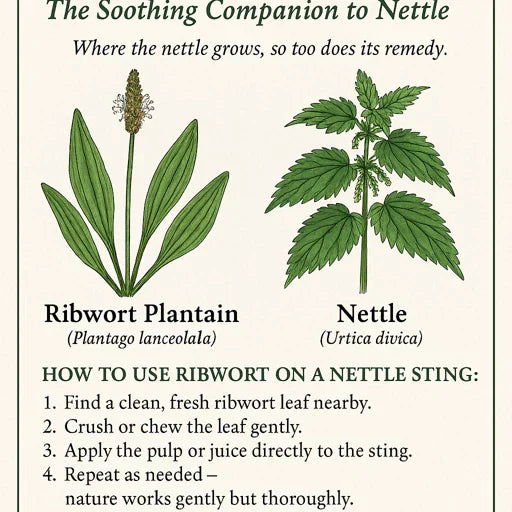Ribwort Plantain: A Gentle Herbal Ally That Grows Where It's Needed Most
At Nettle Revolution, we honour the many ways nature supports our health, healing, and daily lives. Among the plants I work with regularly, one quiet herb continues to stand out for its gentle magic: ribwort plantain.
You’ll find two types growing side by side - one with broad leaves and another with slender, upright leaves like sentinels. Both share the same medicinal properties, but Plantago lanceolata, known as ribwort, is especially valued for supporting respiratory health. It offers relief for dry coughs, bronchitis, and asthma.
While nettles have taken centre stage in my journey, ribwort has become the humble companion that brings the picture into balance. If nettle is the fiery spark that wakes us up, ribwort is the calming hand that says, "Breathe. Soften. Rest."
And often, they grow together, as if nature herself has placed them side by side. A remedy beside the sting. That is herbal wisdom in action.
Although the dock leaf (Rumex species) has long been used for nettle stings, it is more of a folk remedy than a healing powerhouse. Ribwort, by contrast, is a true herbal ally.
What is Ribwort Plantain?
Ribwort plantain (Plantago lanceolata and Plantago major) is a common plant you’ll find along woodland paths, grassy verges, and hedgerows - often right beside the nettles. Its long-ribbed leaves lie close to the ground, while its brown, brush-like flower head rises gently without drama. You may have walked past it hundreds of times, never noticing the gifts it holds.
But this quiet plant is a gentle powerhouse.
Why Ribwort is So Special
I like to think of ribwort as the yin to nettle’s yang. Where nettle brings heat, ribwort brings cool. Where nettle stirs the blood, ribwort soothes and settles.
Here are just a few of the ways ribwort supports our well-being:
Eases Coughs and Sore Throats
Ribwort contains mucilage, a natural gel that soothes irritation in the throat and lungs. It’s wonderful for dry coughs, bronchitis, and asthma, as it coats and protects delicate tissue.
Heals the Skin Naturally
This is one of my favourite uses. If you’re stung by a nettle, simply pick a ribwort leaf, crush it between your fingers or chew it into a pulp, and apply it directly to the sting. It reduces swelling, eases the itch, and calms the burn. It also works beautifully for insect bites, grazes, and small wounds.
If ribwort isn't nearby, the dock leaf can be used. While not as effective, its cooling water content and mild astringency may offer a bit of relief.
Supports Digestion and Urinary Health
Ribwort soothes inflammation in the gut and urinary tract. It helps relieve discomfort from infections, diarrhoea, or an upset stomach, gently toning and healing the tissues.
A Natural Shield
This plant is antimicrobial, antiseptic, and anti-inflammatory, offering quiet protection without disturbing the body’s natural balance. It is like a little herbal shield, always nearby.
How to Use Ribwort Plantain
You don’t need a fancy kit to use ribwort. Here are some simple ways to bring it into your everyday life:
- Fresh Poultice – Crush a fresh leaf and place it on stings, bites, or cuts for fast relief.
- Herbal Tea – Steep dried leaves to soothe sore throats and calm the chest.
- Infused Oil – Soak fresh ribwort leaves in olive oil for a few weeks, then strain to create a healing oil for the skin.
- Cough Syrup – Combine the infused oil or liquid with honey for a gentle homemade cough remedy.
Always gather from clean, unsprayed areas, and take a quiet moment to thank the plant as you harvest.
Nature’s Balance
For me, ribwort and nettle are like two sides of the same healing coin. One gives energy and fire. The other offers rest and repair. Together, they teach me about balance - of strength and softness, of action and stillness.
At Nettle Revolution, we’re not just working with plants. We’re learning from them. Ribwort reminds me that the remedy is often growing right beside the challenge. We just need to notice.
So next time you find yourself among the nettles, pause and look closely. Ribwort might be there too, quietly offering its hand.
With care and green blessings,
Jane Gray
Soft without the sting

